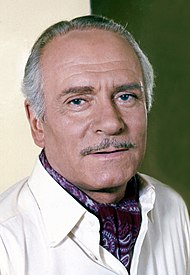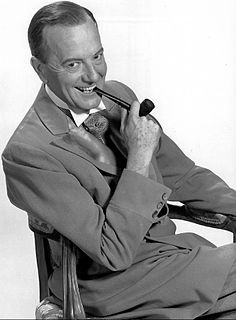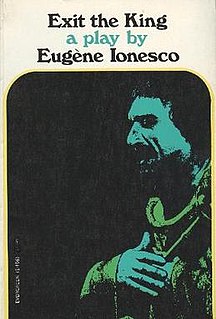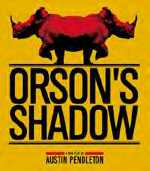Production
In March 1960, Welles's play Chimes at Midnight had just closed after an unsuccessful run in Dublin, dashing his hopes of transferring to London. But the commercial failure of the play made that impossible, and Welles sought a new project. He was approached by his de facto British agent Wolf Mankowitz with an offer to direct Rhinoceros. In later years, he admitted to one biographer that he had been mainly motivated by the chance to work with Olivier, whom he had long admired, but that he thought "It's a terrible play. I hate it...But I wanted to do it because of Larry." [1] He told another biographer "I didn't like the play. I agreed to it because I thought the gimmick was good enough so that you could invent an evening in the theatre about it. And it worked - it always seems to work everywhere no matter how it's done. But throughout rehearsals, every day, it seemed to me I liked Ionesco less as a playwright." [2]
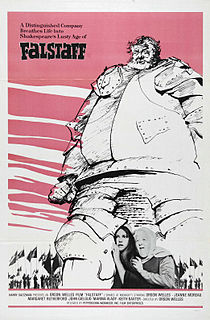
Chimes at Midnight, is a 1965 English-language Spanish-Swiss period comedy-drama film directed by and starring Orson Welles. The film's plot centres on William Shakespeare's recurring character Sir John Falstaff and the father-son relationship he has with Prince Hal, who must choose between loyalty to his father, King Henry IV, or Falstaff.
Cyril Wolf Mankowitz was an English writer, playwright and screenwriter. He is particularly known for three novels—A Kid for Two Farthings, Make Me an Offer, and My Old Man's a Dustman—and other plays, historical studies, and the screenplays for many successful films which have received awards including the Oscar, Bafta and the Cannes Grand Prix.
In this production, the play was relocated from a busy Paris street to a London pub, with a highly elaborate set filled with swinging doors, trapdoors, television monitors, trick mirrors, and advanced special effects. [3]
As well as directing the play, Welles also designed the set, costumes, lighting and sound effects. The production was troubled, with Olivier and Welles clashing in their interpretations of the play. [4] Welles described "The way [Olivier] got me in this was to take all of my directions like a perfect soldier, never argue with them, and always do them...and he took every actor aside and told them I was misdirecting them. Instead of making it hard for me to direct him, he made it almost impossible for me to direct the cast. He got them off in little groups and had quiet little rehearsals having nothing to do with me." Olivier then repeated something he had done to John Gielgud who was directing him in a play several years earlier - he told Welles in front of the entire cast that the director should not return to future rehearsals, as he was upsetting them all so much - Welles recalled "He told me to stay home, and I did! I was so humiliated and sick about it that you can't imagine. I had to come for the dress rehearsal because I'd designed the sets, and I had to supervise that, and light it, and so on...[but] I never went back to the play. They changed the cast, and they had Maggie Smith in, and they had Alan Bates, and they moved to another theatre. But I didn't go to rehearsals. All those actors think very badly of me because they think that I simply wasn't interested - I was so humiliated, I didn't know how to come back!...He's the leader of the English stage, he's playing the leading role, and directing it all the time! What was I going to do? Yes, it was a black moment." [5] After over thirty years of directing plays, it was Welles's last assignment as a theatre director, even though he was to live another 25 years.

Sir Arthur John Gielgud, OM, CH was an English actor and theatre director whose career spanned eight decades. With Ralph Richardson and Laurence Olivier, he was one of the trinity of actors who dominated the British stage for much of the 20th century. A member of the Terry family theatrical dynasty, he gained his first paid acting work as a junior member of his cousin Phyllis Neilson-Terry's company in 1922. After studying at the Royal Academy of Dramatic Art he worked in repertory theatre and in the West End before establishing himself at the Old Vic as an exponent of Shakespeare in 1929–31.

Dame Margaret Natalie Smith is an English actress. She has had an extensive, varied career on stage, film, and television, spanning over 67 years. Smith has appeared in over 50 films, and is one of Britain's most recognizable actresses. A prominent figure in British culture for six decades, she was made a Dame by Queen Elizabeth II in 1990 for services to the performing arts, and received the Companion of Honour from the Queen in 2014 for services to drama.

Sir Alan Arthur Bates, was an English actor who came to prominence in the 1960s, when he appeared in films ranging from the popular children's story Whistle Down the Wind to the "kitchen sink" drama A Kind of Loving.
Welles's absence in the run-up to the play's dress rehearsal meant that several technical issues with lighting and sound effects were not resolved in time for the play's opening. Accordingly, at the opening night, Welles rigged up a microphone on the right-hand aisle of the dress circle, sat there, apologised to the audience for the experience of theatre never being complete, and then during the performance he proceeded to give lighting directions and instructions to the actors, i.e. "Louder, louder...Take down the music...Now lift the curtain...Now, now. Faster!...More rhino roars! More...That's it." [6]
The play opened at the Royal Court Theatre, London, on 28 April 1960, where it played until 7 June. On 8 June, it transferred to the Strand Theatre, until it finally closed on 30 July.
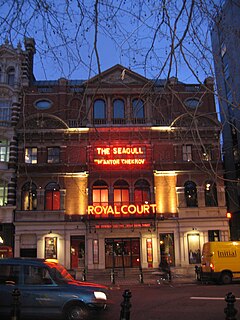
The Royal Court Theatre, at different times known as the Court Theatre, the New Chelsea Theatre, and the Belgravia Theatre, is a non-commercial West End theatre on Sloane Square, in the Royal Borough of Kensington and Chelsea, London, England. In 1956 it was acquired by and remains the home of the English Stage Company and is notable for its contributions to contemporary theatre.

The Novello Theatre is a West End theatre on Aldwych, in the City of Westminster. It was known as the Strand Theatre between 1913 and 2005.
Olivier and Plowright had fallen in love during the making of The Entertainer earlier that year, although Olivier was still married to Vivien Leigh, and the affair of the two actors first became public during the play's run, when Leigh announced her husband wanted a divorce, causing a minor scandal at the time. [7]


